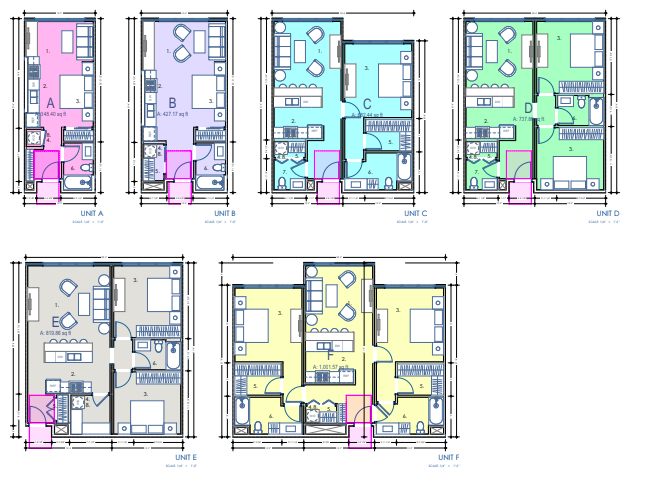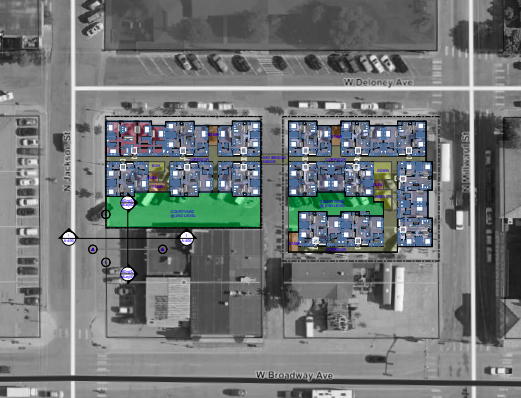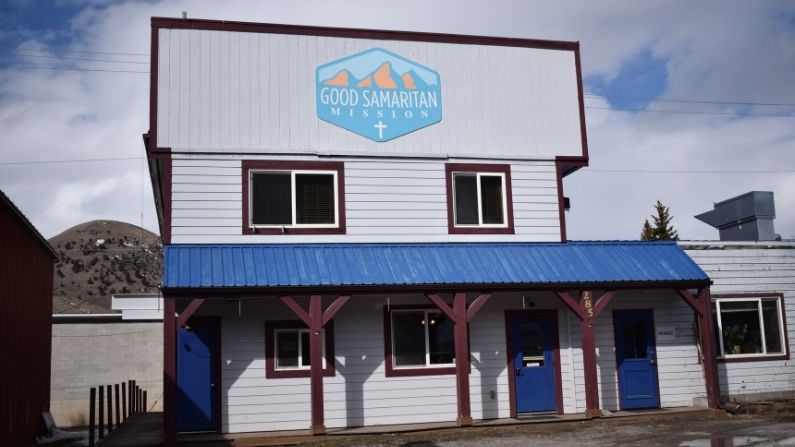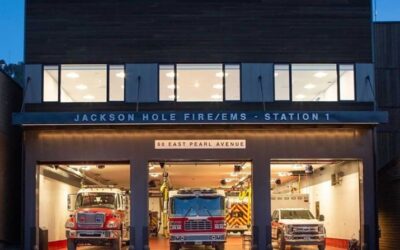The Good Samaritan Mission of Jackson Hole is seeking assistance from local government officials to build a transitional family shelter in Teton County. They’re asking for both Special Excise Tax funding and town land so they can complete this project, which they say will bring vital human services infrastructure that doesn’t currently exist to the local community. KHOL talked with Bill Voge, Board Chair of the Good Samaritan Mission, to learn more.
The following transcript has been lightly edited for brevity and clarity.
Will Walkey/KHOL: Can you talk a little bit about what transitional housing is and why it’s important for Jackson Hole?
Bill Voge/Good Samaritan Mission: Yeah. Good Samaritan Mission has been operating for 40 years, and it provides a shelter for single men and single women. But it has never offered or been able to offer any type of shelter for families. So our project for the transitional housing is essentially a shelter for families, which most of the time means a mother and one, two or three children. And it will allow a single mom and her children, when they find themselves without a home, to come to the housing on a transitional basis until they get their feet back on the ground, with the ultimate goal to return them to independent living. Similar to what we do right now with the single men and women that visit our shelter.
KHOL: How long do people typically stay when they’re at your current facility?
Voge: At our current facility, it ranges from a few days, a fair number, several weeks and, for some, several months. Each time a person comes to our shelter, we try to find out what led them to become homeless because you can’t solve a homeless situation until you get behind, why are they homeless?
And for some folks, we have to provide them, get them, professional training, help, counseling. For approximately 20-25% of the men coming to shelter, they have alcohol or drug issues, and we do not allow people to be at the mission that have an alcohol or drug issue. They’ve got to be sober. But we do find them professional help, rehab, etc. In those situations, they’re at the mission, usually longer, assuming they stay sober, until they get their feet back on the ground.
Some people are at the mission just because they lost their latest lease and they need a week or two to find a new place to stay. So it varies. Each case is unique, and our job is to try to get them so they return to independent living. And the same would be true with respect to our transitional housing. We’re not building housing for families to show up for two or three years. We’re building housing for the families to show up, [and] for us to assess what their needs are. And that usually is a health assessment, mental health assessment, financial assessment, and then try to work through the obstacles facing them that caused them to be homeless.
KHOL: have a feeling a lot of listeners might say, ‘hey, I know we have a housing problem in Jackson Hole. I don’t necessarily feel like, or I don’t necessarily see every day, that we have a homelessness issue in Jackson Hole.’ Can you just talk a little bit about, as someone who’s working with this issue all the time, the prevalence of homelessness in Jackson Hole and how big of an issue it really is?
Voge: Yeah, the number of people, the number of families homeless in Teton County, is unknown. There’s not good data. We at the mission started, about three years ago, a survey of other nonprofits, the police department, churches, others in the community, and we started asking the question, ‘how familiar are you with homeless families in Jackson or in Teton County? How often are you seeing it?’ And we tried to get our arms around it. And as we did that survey, we came to a pretty quick conclusion that there is a big need.
Now, what happens when a family becomes homeless? You don’t see them. They move from place to place night after night. Sometimes they live with relatives in very, very overcrowded housing. Several people reported to me that a fair number of families have literally slept on the floor of teachers at Munger school. So actually finding the precise number of families in Teton County that are homeless at any given time is extremely difficult.
But the view of the Good Samaritan Mission is no family in Teton County should be homeless without shelter. No one should be living overnight in their car, and no one should be living with their family, crowded in a living room of a teacher. We need, like most communities in America, a place for them to go to get back on their feet.

A mock floor plan for the Good Samaritan Mission’s transitional shelter. They’re hoping to build approximately 30 units. (Screenshot courtesy of the Good Samaritan Mission)
KHOL: Thank you. And so let’s go to the proposal that you at the Good Samaritan Mission are hoping that people can get on board with. Can you just outline a little bit of what you are trying to build and why it could help?
Voge: We’ve determined that it would be ideal for Teton County if we could build approximately 30 units of shelter made up primarily of small two bedrooms and small three-bedroom apartments. And that would be shelter for anyone that finds themselves out of a place to stay.
Recently, there was a fire in an apartment development in Jackson. In other communities with family shelters, instead of those five or six families scrambling to find a motel, a family shelter would be able to take them almost instantly. They could, you know, get their lives back to order and find longer-term transitional housing.
But that’s what we’re trying to build is essentially small apartment dwellings. They’d be all together. We’d have our employees there 24-7, which is what we need to do to have a regulated family shelter. As part of that, it’d be more than transitional housing.
Usually, when you find yourself homeless, you’re one of the most vulnerable members of the community. Many times there’s also food insecurity issues. Oftentimes, there’s job issues. Sometimes, there are serious health issues. But we will examine closely, ‘why are you homeless?’ And start fixing each of the components of what caused the homelessness. And so that’s the real difference between just housing and what we’re proposing.
We’re proposing transitional housing that’s more than just housing. It’s providing the support services that are necessary to get them back into independent living. Until they’re in independent living, they cannot have a high self-esteem. It’s clear. All the data. The longer you live in the shelter, the lower your self-esteem. In order to get out to return to good self-esteem, you must be living independently and in your own residence, whatever that is.
KHOL: Let’s talk a little about the location. You’re hoping to use town land for this. Why this location?

The Good Samaritan Mission’s proposed location for the shelter is currently a town-owned parking lot. Their plan would not remove any spots downtown. (Screenshot courtesy of the Good Samaritan Mission)
Voge: So we had informal discussions with the town. Were there other town parcels or county-owned parcels that might work for us? And in those discussions, 230 and 270 West Deloney [Avenue] came up, which is currently a parking lot operated by the town. We do not have the green light to have that property. We have made a proposal with the hopes that the town would be agreeable.
And the second part of your question is, it’s ideal. It’s near a bus stop. It’s near a bike lane. It’s near a bank. It’s near a grocery store. It’s across from the park. And so if you look at all the criteria that typically go into choosing a location for any type of homeless shelter, family shelter, etc., it’s a pretty ideal location.
Walkey: You’re also hoping for $10 million in Special Excise Tax (SPET) funding. Can you talk a little bit about what that funding would go towards?
Voge: Well, we currently have a very preliminary budget for this project of $19-20 million. And we’ve got multiple sources of funding we’re looking at. Yes, SPET funding is one we’re aspiring to have, and that would be to partially cover the cost of this project. It isn’t the only funding. We’re looking at moneys coming from the Wyoming Community Development Authority, a capital campaign and [we’re] asking other nonprofits and foundations to contribute. So the funding plan itself is in a very preliminary stage, but the SPET would be a meaningful part of what we need to build this project.
KHOL: I’m just curious, what’s been the response so far from folks that you’ve been reaching out to about this project?
Voge: It’s incredible support. Many other nonprofits have come to us and said it’s about time. We need it. We have had informal conversations with members of the Town Council. We’ve had informal conversations with the commissioners of Teton County. Thus far, the one thing that’s not in dispute at all is the need for family housing. Everyone agrees. Everyone knows of stories in the last couple of years—whether it be from the police department, from churches, from other nonprofits in town—of families without houses. And it’s very difficult for the servants in this town, whether they be on the town council or the town staff or the police department, to find a family that doesn’t have a home for the night. And absolutely no place to take them other than perhaps a hotel or motel.
KHOL: You know, the town has to make choices with what to do with funding, what to do with SPET initiatives and what to do with its land. I’ve been reading a lot of different proposals. Different projects that people want to do with future funding. Can you just pitch a little bit of why this is important. Why the town should choose this to fund and to really care about and put all of its effort towards?
Voge: Yeah. First of all, I know I speak on behalf of the entire board at Good Samaritan Mission. There are many incredible projects facing the Town Council and the commissioners for SPET funding. We know we’re not the only ones. And we know that our elected officials will need to make some tough decisions. We strongly support the other housing initiatives, particularly the workforce housing. Our request relates to a lack of affordable housing that’s quite different. It overlaps health and human services.
None of the beneficiaries of our housing will ever be able to go before the town council and say, ‘we need your moneys.’ We’re out there speaking for the most vulnerable people in our community. People that may not know today that, a year from now, they’re going to be down on their luck. They’re going to have a serious car accident. They’re going to have a terrible illness. They’re going to be abandoned by their spouse or abused by their spouse. And those are the people we’re trying to represent today, and we’re fortunately having a great reception from the audience we’re talking to.
We’d rather it be other nonprofits who are out front seeing distressed families without housing or our elected officials who realize that they’re hearing, every which way possible, the need that’s in this community. So we hope as the elected officials do their tough job, and it is a tough job. I mean, to be in government means nothing more than making decisions. We hope that as they slice up the pie and allocate those funds, we’re on that list. And we don’t intend to do anything other than partner with them. Our goal from day one—and will be until this project’s over—is to consider the town council and the commissioners as our partners. And we respect [that] they’ve got to make some tough decisions. And they not may not be aligned with us on the dollar amount that we want. We don’t know. But we do know, they’ve made it loud and clear, they agree with the need and they support our cause.
The Good Samaritan Mission is currently in the preliminary planning stages of their family shelter project, but they’re hoping to begin full operations, assuming everything goes smoothly, by the spring of 2024. Their proposals to use both SPET funding and town land are pending.





